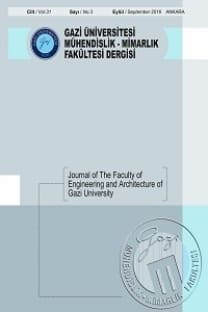İş paketi sürelerinin belirli olduğu kaynak kısıtlı proje planlama problemi için öncelik kuralı
Kaynak Kısıtlı Proje Planlama, Proje Yönetimi, Proje Planlama, Öncelik Kuralları, Çizelgeleme
Priority rule for resource constrained project planning problem with predetermined work package durations
Resource Constrained Project Scheduling, Project Management, Project Planning, Priority Rules, Scheduling,
___
- Tapkan, P. Z., Özbakır L. et al., Modelling and solving railway crew rostering problem, Journal of the Faculty of Engineering and Architecture of Gazi University, [S.l.], v. 33, n. 3, apr. 2018. ISSN 1304-4915.
- Uçar U. Ü., İşleyen S. K., Solving Makeup Course Timetabling Problem (MCTP) WithMathematical Modelling: A Real Case Applicatio, Journal of the Faculty of Engineering and Architecture of Gazi University, [S.l.], v. 31, n. 2, jun. 2016. ISSN 1304-4915.
- Demir Y., Çelik C., An Integer Programming Approach For Curriculum BasedTimetabling Problem Solution, Journal of the Faculty of Engineering and Architecture of Gazi University, [S.l.], v. 31, n. 1, mar. 2016. ISSN 1304-4915.
- Ertogral K., Erkoç M., Ülker D. H., A Production Scheduling Model And Analysis For TheMaintenance Repair And Overhaul Service Providers, Journal of the Faculty of Engineering and Architecture of Gazi University, [S.l.], v. 30, n. 3, Oct. 2015. ISSN 1304-4915.
- Bektur G., Saraç T., Two parallel injection machine scheduling under crane constraint, Journal of the Faculty of Engineering and Architecture of Gazi University, [S.l.], v. 31, n. 4, dec. 2016. ISSN 1304-4915.
- Bibiks K., Hu Y. F. et al., Improved discrete cuckoo search for the resource-constrained project scheduling problem, Appl. Soft Comput. J., c. 69, ss. 493–503, 2018.
- W. Xiao, H. Deng et al., Factored Grey Wolf Optimizer With Application, ICIC International, c. 14, no 3, ss. 881–897, 2018.
- Gonzalez-Pardo A., Del Ser J., Camacho D., Comparative study of pheromone control heuristics in ACO algorithms for solving RCPSP problems, Appl. Soft Comput. J., c. 60, ss. 241–255, 2017.
- Afshar-Nadjafi B., Basati M., Maghsoudlou H., Project scheduling for minimizing temporary availability cost of rental resources and tardiness penalty of activities, Appl. Soft Comput. J., c. 61, ss. 536–548, 2017.
- Đumić M., Šišejković D. et al.,Evolving priority rules for resource constrained project scheduling problem with genetic programming, Futur. Gener. Comput. Syst., c. 86, ss. 211–221, 2018.
- Jedrzejowicz P., Ratajczak-Ropel E., Reinforcement Learning strategies for A-Team solving the Resource-Constrained Project Scheduling Problem, Neurocomputing, c. 146, ss. 301–307, 2014.
- Zheng X. L., Wang L., A multi-agent optimization algorithm for resource constrained project scheduling problem, Expert Syst. Appl., c. 42, sayı 15–16, ss. 6039–6049, 2015.
- Coelho J., Vanhoucke M., An exact composite lower bound strategy for the resource-constrained project scheduling problem, Comput. Oper. Res., c. 93, ss. 135–150, 2018.
- Elsayed S., Sarker R. et al., Consolidated optimization algorithm for resource-constrained project scheduling problems, Inf. Sci. (Ny)., c. 418–419, ss. 346–362, 2017.
- Koulinas G., Kotsikas L., Anagnostopoulos K., A particle swarm optimization based hyper-heuristic algorithm for the classic resource constrained project scheduling problem, Inf. Sci. (Ny)., c. 277, ss. 680–693, 2014.
- Kumar N., Vidyarthi D. P., A model for resource-constrained project scheduling using adaptive PSO, Soft Comput., c. 20, no 4, ss. 1565–1580, 2016.
- Wang Y., He Z. et al., On the performance of priority rules for the stochastic resource constrained multi-project scheduling problem, Comput. Ind. Eng., c. 114, sayı June, ss. 223–234, 2017.
- Chen Z., Demeulemeester E. et. al, S. Bai, ve Y. Guo, Efficient priority rules for the stochastic resource-constrained project scheduling problem, Eur. J. Oper. Res., c. 270, sayı 3, ss. 957–967, 2018.
- Eren T., Minimizing The Maximum Lateness In A Scheduling ProblemWith A Time-Dependent Learning Effect: A Non-Linear Programming Model, Journal of the Faculty of Engineering and Architecture of Gazi University, [S.l.], v. 23, n. 2, Mar. 2008. ISSN 1304-4915.
- Chand S., Huynh Q. et al., On the use of genetic programming to evolve priority rules for resource constrained project scheduling problems, Inf. Sci. (Ny)., c. 432, ss. 146–163, 2018.
- Šišejkovi´c D., Evolution Of Scheduling Heuristics For The Resource Constrained, University of Zagreb, 2016.
- PSPSolver. https://pspsolver.soft112.com/. Erişim tarihi: Mart 2019.
- Box Stacking Problem. https://people.cs.clemson.edu/~bcdean/dp_practice/. Erişim tarihi: Mart 2019
- PSPLib. Web Sitesi: http://www.om-db.wi.tum.de /psplib/getdata.cgi?mode=sm. Erişim tarihi: Mart 2019
- Graphviz. Web Sitesi: http://www.graphviz.org. Erişim tarihi: Mart 2019
- ISSN: 1300-1884
- Yayın Aralığı: 4
- Başlangıç: 1986
- Yayıncı: Oğuzhan YILMAZ
Tedarikçi seçimi için yeni bir aralık tip-2 hibrit bulanık kural tabanlı AHP sistemi
Hazal Berrak GENÇDAL, Saadet Arzu BERİLGEN, Havvanur KILIÇ
Alper ALVER, Aylin ALTINIŞIK TAĞAÇ, Ahmet KILIÇ
IEEE 802.11 MAC Protokolünün VANET ağlardaki performans modellemesi ve analizi
Muhammet Ali KARABULUT, A.f.m. Shahen SHAH, Hacı İLHAN
Kürşad GÖV, Osman SOYDAN, Ömer EYERCİOĞLU
Akif AKGÜL, Mustafa Zahid YILDIZ, Ömer Faruk BOYRAZ, Emre GÜLERYÜZ, Sezgin KAÇAR, Bilal GÜREVİN
Didem OKTAY, Mehmet UĞURYOL, M. Buğra GÜNER, A. Binnaz HAZAR YORUÇ, Nabi YÜZER
